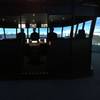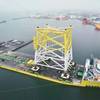New ships today are no more efficient than they were over twenty years ago, despite shipping industry claims to the contrary. The efficiency of new ships has deteriorated by 10% on average since 1990.
The study also shows that containerships built 30 years ago already, on average, beat the "Energy Efficiency Design Index" (EEDI) standard set by IMO for new ships built in 2020.
The study, "Historical trends in ship design efficiency," has been carried out by Netherlands-based CE Delft, which describes itself as an "independent research and consultancy organization specialized in developing innovative solutions to environmental problems." It was commissioned by Seas At Risk and Transport & Environment (both members of the Clean Shipping Coalition), and supported by the European Climate Foundation.
“This would imply a 30-year stagnation of efficiency improvement, meaning that reducing shipping volumes would be the only avenue for net reductions of emissions.”
The study analyzed the development of the design efficiency of new ships built over the last 50 years, using efficiency indicator values.
The study also shows that, in general, the design efficiency of new ships improved significantly in the 1980s was at its best in the 1990s and has deteriorated in the 2000s.
The best-designed bulkers were built around 1990 and are some 14% more efficient than those built today. The most efficient tankers were built around 1988, which run around 10% better than those built today.
The difference for container ships was far greater. Those built in 1985 were about 25% better than those built in 2013. This does not, however, reflect the large reductions in CO2/TEU/mile for containers due to increasing ship size and improving engine efficiency over this period, the study notes.
“The relevance of this study for the review of the IMO’s design efficiency standards is that it suggests that ships can improve their design efficiency by 5% to 15% on average just by going back to 1990s designs. Analysis of the design efficiency of ships that have entered the fleet since 2009 would appear to show this has in fact been happening,” the study said.














